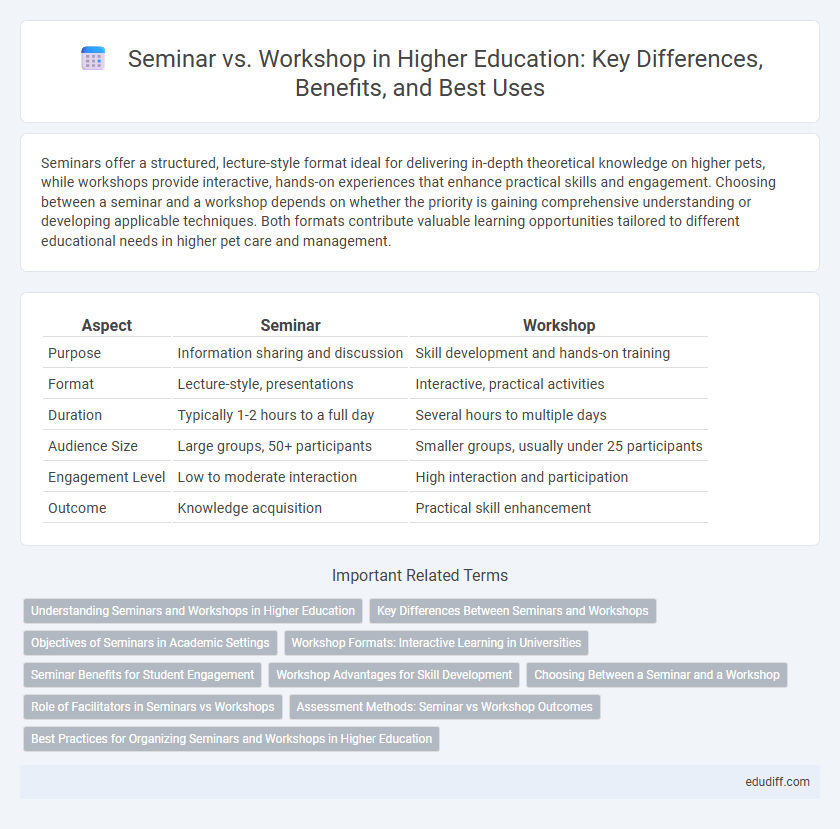Seminars offer a structured, lecture-style format ideal for delivering in-depth theoretical knowledge on higher pets, while workshops provide interactive, hands-on experiences that enhance practical skills and engagement. Choosing between a seminar and a workshop depends on whether the priority is gaining comprehensive understanding or developing applicable techniques. Both formats contribute valuable learning opportunities tailored to different educational needs in higher pet care and management.
Table of Comparison
| Aspect | Seminar | Workshop |
|---|---|---|
| Purpose | Information sharing and discussion | Skill development and hands-on training |
| Format | Lecture-style, presentations | Interactive, practical activities |
| Duration | Typically 1-2 hours to a full day | Several hours to multiple days |
| Audience Size | Large groups, 50+ participants | Smaller groups, usually under 25 participants |
| Engagement Level | Low to moderate interaction | High interaction and participation |
| Outcome | Knowledge acquisition | Practical skill enhancement |
Understanding Seminars and Workshops in Higher Education
Seminars in higher education promote in-depth discussion and critical analysis of specific topics, encouraging student engagement and knowledge exchange. Workshops focus on practical skills development through hands-on activities, enhancing experiential learning and applied competencies. Both formats support diverse learning outcomes by combining theoretical insights with active participation.
Key Differences Between Seminars and Workshops
Seminars typically involve larger groups focused on delivering theoretical knowledge through presentations, while workshops emphasize hands-on activities and interactive learning in smaller settings. Seminars often last several hours to days, prioritizing information dissemination, whereas workshops are more intensive, fostering skill development through practical exercises. The distinction lies in engagement style, with seminars being more passive and workshops promoting active participation for deeper comprehension.
Objectives of Seminars in Academic Settings
Seminars in academic settings aim to deepen students' understanding of specialized topics through expert-led discussions and presentations. They foster critical thinking and knowledge sharing by encouraging active participation and debate among attendees. Seminars also facilitate networking opportunities and collaboration, contributing to academic and professional growth.
Workshop Formats: Interactive Learning in Universities
Workshop formats in universities emphasize interactive learning through hands-on activities, group discussions, and real-time problem-solving, fostering deeper engagement compared to traditional seminars. Participants in workshops actively apply concepts, collaborate with peers, and receive immediate feedback, enhancing skill acquisition and critical thinking. This experiential approach aligns with modern educational strategies prioritizing student-centered learning and practical competence development.
Seminar Benefits for Student Engagement
Seminars promote student engagement by encouraging interactive discussions and critical thinking through expert presentations and Q&A sessions. They provide opportunities for networking and exposure to current academic and industry trends, enhancing students' practical knowledge and motivation. The structured format of seminars helps students develop presentation skills and deepen their understanding of complex subjects.
Workshop Advantages for Skill Development
Workshops offer interactive, hands-on learning experiences that significantly enhance skill development compared to traditional seminars. Participants engage directly with practical tasks, fostering deeper understanding and immediate application of knowledge. The collaborative environment in workshops encourages peer feedback and personalized guidance, accelerating mastery of specific skills.
Choosing Between a Seminar and a Workshop
Choosing between a seminar and a workshop depends on your learning objectives and interaction preferences. Seminars typically offer broader theoretical knowledge through lectures and presentations, making them ideal for gaining insight into a topic. Workshops emphasize hands-on activities and practical skills development, providing a more immersive and interactive experience.
Role of Facilitators in Seminars vs Workshops
Facilitators in seminars primarily guide structured presentations, ensuring clear communication and managing audience interactions to enhance knowledge dissemination. In workshops, facilitators adopt a more active role by encouraging hands-on participation, collaboration, and skill-building exercises to foster experiential learning. The effectiveness of both formats relies heavily on the facilitator's ability to adapt their approach to either deliver content or cultivate an engaging, interactive environment.
Assessment Methods: Seminar vs Workshop Outcomes
Seminar assessment methods primarily involve presentations, reflective essays, and participation evaluations to gauge comprehension and critical thinking. Workshop assessments emphasize practical tasks, peer feedback, and project-based evaluations, reflecting hands-on skill development and application. Both methods measure learning outcomes differently, with seminars focusing on theoretical understanding and workshops on experiential proficiency.
Best Practices for Organizing Seminars and Workshops in Higher Education
Effective organization of seminars and workshops in higher education requires clear objectives, targeted audience identification, and engaging content tailored to academic needs. Incorporating interactive elements, such as Q&A sessions and group activities, enhances participant engagement and knowledge retention. Efficient logistical planning, including venue selection, scheduling, and resource allocation, ensures smooth execution and maximizes the educational impact.
Seminar vs Workshop Infographic

 edudiff.com
edudiff.com